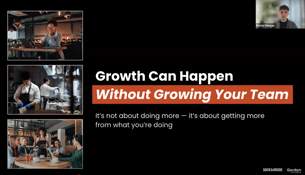In 2007, straight out of college, Alex Smith opened his first restaurant, a Häagen-Dazs franchise in Baltimore’s Harbor East neighborhood. He hasn’t looked back ever since.
Inspired by the success of his grandfather’s H&S Bakery business, Smith quickly started launching concepts of his own. Fast forward fifteen years, and he now runs 28 original concepts, with two more set to open in 2023. (The Harbor East Häagen-Dazs franchise also remains in operation.)
Smith officially launched Atlas Restaurant Group in 2012, and a decade later, the restaurant group is now reporting $130 million in annual net sales. Smith currently claims to be the youngest owner of a restaurant group of Atlas' size in the U.S.
“I'm not aware of anybody that’s approaching $200 million in the privately held, multi-concept operations [business] that’s in their 30s,” says 38-year-old Smith.
We chatted with Smith to learn more about his expansion, his lessons learned along the way, and what he considers the key factors to Atlas’s success.
I’d love to hear about your experience leading up to Atlas Restaurant Group and what inspired you to get into the restaurant industry.
My grandfather owned one of the largest commercial, private bakeries in the country, H&S Bakery. Then he started in the real estate business. As he started developing real estate, I started developing hospitality. He's the one that inspired me to get into the food business. All of his best buddies owned diners and carry-outs. His parents immigrated from Greece, and a lot of our family friends were in the restaurant business, and it was always something I looked up to and appreciated.
I started with the Häagen-Dazs franchise. There was a theater next door, and opening an ice cream store next to a movie theater felt like common sense. After two years of learning and saving up money, I opened Harbor East Deli, at a time when there was no sandwich shop or even pizza shop in the area.
I’ve always had a passion for developing concepts. All the concepts are developed by me and my brother, from the menu to the design to the name, and that’s what led to being a multi-concept operator rather than just stamping out locations of the same thing. I wanted to be engaged in a bunch of different types of creative work.
Now that you’ve expanded into dozens of concepts, what do you consider the key factors that have enabled Atlas to grow, and with such success?
In our own market, where we have a name and a brand, second generation opportunities are huge – taking over a space where a restaurant went out of business or closed. We’re seizing a lot of opportunity in historic spaces that were already built out for restaurants and completely remodeling them with our concepts. I’d say half of our portfolio is second generation.
Coming up this year, we'll be approaching 2,000 employees. So I think about that a lot. But we’re growing organically. We’re not a company taking outside capital or private equity money to expand. Our bandwidth for opening restaurants is no more than four or five units a year. So our model for success is slow growth, put out a high-quality product, and train our people. It’s methodical.
You’ve also mentioned in the past that your approach to staffing has helped in your growth. Can you share what that looks like for you?
We saw prices rising on us but also on our employees. We want to make sure that we're setting a baseline, so when people come into our organization, they know they’re going to make at least X and go from there. So we raised the minimum wage to $15 an hour last year. That should be an industry standard, and we'll likely raise it again. And when I say $15 an hour, I'm talking about entry level positions – a high school dishwasher or college kid as a hostess. Most of our hourly employees are making $18-plus all the way into the $20s. We just use it as a baseline, but I thought it was an important measure to put down.
We have elective health insurance, pet insurance, and every employee gets life insurance. And I can tell you, things like life insurance matter. Unfortunately, when you have 2,000 employees, tragedies happen, and you want to make sure that the family’s compensated and can take care of the things that need to be taken care of.
Have the wage minimums and benefit offerings helped with staffing and retention?
The benefit of a company of our size is that there are systems. When there is an issue, we have a whole team of people that’s there to correct things. We’re organized, there’s opportunity for a 401K and benefits, and a living wage, and then also room to grow. We have a lot of our servers who started as support staff and managers who started as servers. We’re cultivating from within, and that’s just worked out really well for us.
The other thing is we give our employees tools that they need to be successful. For instance, chefs can cultivate their own produce on our farm. Our servers are selling a really quality, high-end product. And when they believe in the organization and the product you're selling, and they’re fairly compensated, that’s how you build the right team and the right company.
Tell me about Atlas Farms. When did you establish that, and what was the thought process behind it?
We opened March of 2020. We’re always looking to find ways to be vertically integrated, and my brother Eric has an affinity for farming. A local farmer that he’s friends with said he’d love a shot at doing something with us. It’s obviously not a cheap venture. And it’s not really a profitable venture. But it’s something that’s good for the environment, our chefs, and our customers. It’s an amenity that betters the quality of our restaurants.
Just this year, we did 50,000 pounds of seasonal produce for our Baltimore restaurants. We’re growing all sorts of things, and the chefs just absolutely love it.
As Atlas has expanded, what are some of the biggest lessons you’ve learned along the way?
You have to accept that you can’t be everywhere at once. If you’re not there running the store yourself, you have to rely on other people. For the most part, you empower your people, and they do the best job they can. Sometimes you have people that unfortunately don’t put your organization in the best light. So it’s about constantly making sure that the standards are met, and that you continue to train and coach your people. That way, the face of your organization, which is your people, is putting out a positive light to your customer base.
Do you have any advice for operators who have a desire to expand or who are perhaps struggling to do so?
Go slow – that’s the biggest thing I could tell you. Our bandwidth, even as big as we are, is four units, maybe five, a year. When we open a unit, I go to that property and spend 60 [days] to 90 days on that property, getting it organized, helping train staff, and looking at the quality of the product and service.
If you can’t do that as an operator, you should not be opening stores. Too many times, people get access to capital and say, “Let’s just open.” But it doesn't work like that. I don’t care if it’s fast casual or a chain restaurant – you have to put in the time to develop that brand standard in whatever unit you’re in, wherever it is, and you and your leadership team have to do it.
Are there any other common mistakes you see operators making that might prevent growth?
We’re a pennies business. Every operator should be looking at a monthly P&L, diving in through the lines, and looking at how they can save their business money. Cash flow equals expansion.
Every year, they should vet out all their vendor contracts. They should be constantly negotiating for better deals, looking at things like entertainment, security, valet – everything is negotiable. You really have to dig in and then adjust.
You can’t look at every little thing. Let's say it's a monthly subscription somewhere – that's not going to get you places. You want to focus on the big dollar items. When you're in the restaurant business, you have a ton of product. So if you're a seafood house, I'd focus on your seafood purveyor. If you’re a steakhouse, focus on your steak. We look at our top 25 vendors, start from the top, and work our way to the bottom, because that's where the money is going.
We’re seeing margins increasingly getting tighter across the industry. Can you share any other insights into how you’re fighting to expand Atlas’s profits?
We like to pay everything in seven-day credit terms. We never let any of our bills get to the 60 [days] or 90 days. When the pandemic hit, we owed seven days. A lot of my friends were out 90 days, and it became so tough to recover after that.
I understand that food, service, and quality of product is so important, but I can’t stress enough that just the basic finances of how you run your business is also so important. You have to pay attention to the details. And when you open a restaurant, make sure you have enough capital to start right. Never start in the hole.
You’ve talked about how design is crucial to a restaurant’s success. Can you share a little more about that?
Absolutely. When you build a restaurant, you're really building an experience for somebody. Design is one of the most important parts. It's from the moment you get to the store, what it looks like on the exterior and the patios, when you walk in and see the host, the experience with the lighting, the photography or artwork – everything is a cultivated experience. Having the right designer and the right mission is key. I use a guy named Patrick Sutton and he just does an incredible job of immersing somebody in an experience.
Where do you envision the future of Atlas?
Just a slow, organic growth of three, four, five units a year. We’ll also focus on the brands that we do have so that they continue to sustain from a quality standpoint. We have stores that are seven to 10 years old and the goal is to always be checking quality – the food, look, and feel. Also, making sure we’re staying up on the current trends in those brands. Trends change, and you have to constantly do research to make sure that brand’s constantly being updated.
Grace Dickinson is a reporter at Back of House. Send tips or inquiries to grace@backofhouse.io.





